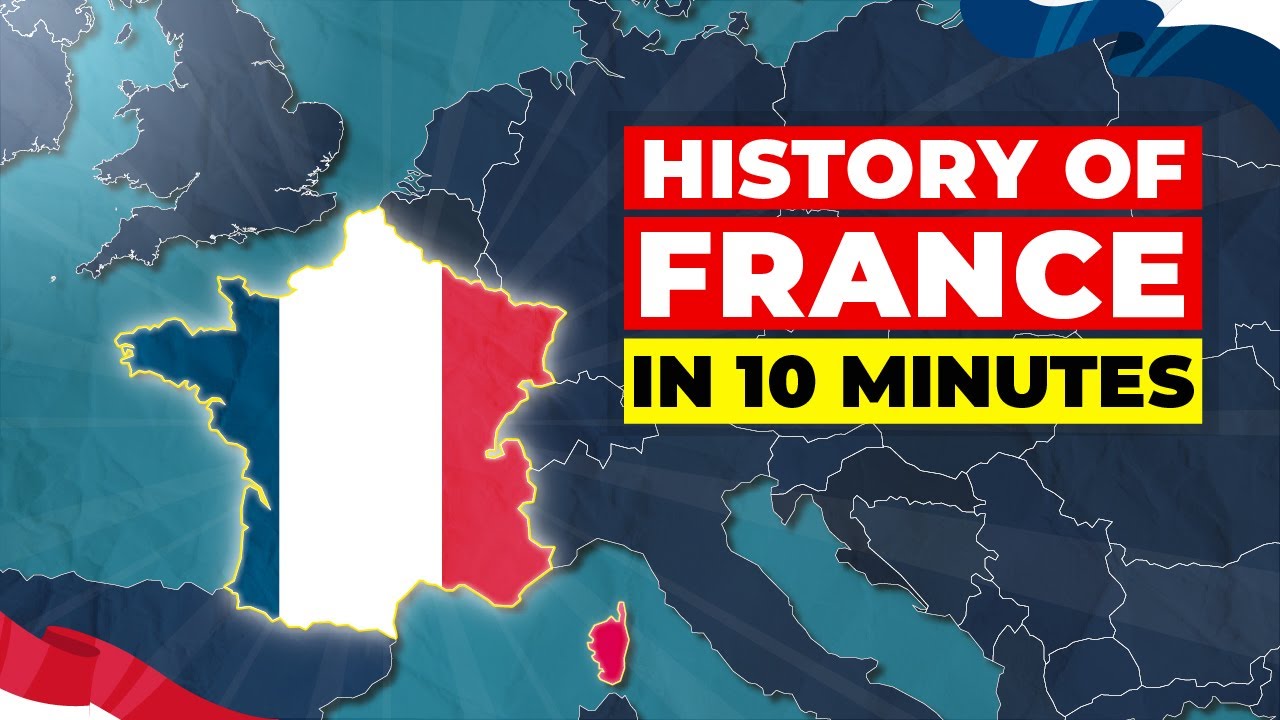The Entire History of France in 23 Minutes
Summary
TLDRThis script traces the tumultuous history of France from the fall of the Roman Empire through the rise of the Franks, the dominance of Charlemagne, and the struggles of the Carolingian dynasty. It highlights key events like the Hundred Years' War with England, the Renaissance, the Reformation, and the French Revolution, leading to the rise and fall of Napoleon. The narrative continues through the world wars, decolonization, and the establishment of the French Fifth Republic, offering a sweeping view of France's evolution as a nation.
Takeaways
- 🏰 The Franks, a Germanic people, established their rule in the region now known as France after the fall of the Roman Empire, leading to the rise of the Merovingian and later Carolingian dynasties.
- 👑 Charlemagne's coronation as Emperor of the Romans in 800 AD marked a high point of power for the Carolingian Dynasty and the Kingdom of the Franks.
- 👶 Hugh Capet's election as king in 987 initiated a period of weak royal authority, with power concentrated in the hands of influential electors and the clergy.
- 🛡️ The Norman invasion of England in 1066 sparked centuries of rivalry and conflict between France and England, including the Hundred Years' War.
- 🗡️ The assassination of Louis of Orléans in 1407 and the subsequent civil war highlighted the power struggles within France during the Middle Ages.
- 🏰 Joan of Arc's intervention in the Hundred Years' War was pivotal for French morale and eventual victory, despite her tragic end.
- 🌏 The Renaissance marked a golden age for French art and culture, coinciding with France's exploration of the New World.
- 🔱 The Habsburg-Valois rivalry, fueled by territorial claims and political marriages, led to over 65 years of conflict between France and the Habsburgs.
- 🕉️ The Protestant Reformation and the subsequent French Wars of Religion caused significant internal strife, culminating in the St. Bartholomew's Day Massacre and Henry IV's Edict of Nantes.
- 👶 Louis XIV, known for his absolute rule and the famous quote 'L'état, c'est moi', had the longest reign of any European monarch, shaping France's political landscape.
- ⚔️ The French Revolution, with its quest for liberty, equality, and fraternity, led to the rise of Napoleon Bonaparte, whose military dictatorship and eventual defeat reshaped Europe.
Q & A
Who were the Germanic people that inhabited the region of modern-day France after the Roman Empire's collapse?
-The Germanic people that inhabited the region of modern-day France after the Roman Empire's collapse were known as the Franks.
What dynasty ruled the united Frankish kingdoms before the Carolingian dynasty?
-The Merovingian dynasty ruled the united Frankish kingdoms before the Carolingian dynasty.
Who was the most powerful man in Europe during the early years of the Carolingian dynasty?
-Charlemagne was the most powerful man in Europe during the early years of the Carolingian dynasty, becoming Emperor of the Romans in 800 AD.
What significant event in French history occurred on Christmas Day, 800 AD?
-On Christmas Day, 800 AD, Charlemagne was crowned Emperor of the Romans, marking a significant event in French history.
Who was the first king of the Capetian dynasty and why is he significant?
-Hugh Capet was the first king of the Capetian dynasty. He is significant because he was elected by the lords of France in 987, marking the end of the Carolingian dynasty.
What event marked the beginning of the Hundred Years' War between France and England?
-The Hundred Years' War between France and England began in 1337 when the French declared a state of war following disagreements over the succession of the French throne.
Who was the French king that was captured by the English during the Hundred Years' War?
-The French king who was captured by the English during the Hundred Years' War was not explicitly named in the script, but it is historically known to be King John II.
What was the significance of the Battle of Agincourt in the context of the script?
-The Battle of Agincourt was significant in the context of the script as it showcased the English military superiority over France and the Burgundians' lack of support for the French.
Who was Joan of Arc and what role did she play in the Hundred Years' War?
-Joan of Arc was a 16-year-old girl who claimed to have heard voices from God to drive out the English from France. She played a crucial role in boosting French morale and turning the tide of the Hundred Years' War.
What was the outcome of the Treaty of Utrecht and its impact on France and Spain?
-The Treaty of Utrecht resulted in Spain losing lands and no longer having a Habsburg monarch. France joined an alliance against Spain, leading to a decisive defeat for Spain and the end of its status as a Great Power.
What was the impact of the French Revolution on the political structure of France?
-The French Revolution led to the abolition of the monarchy and the establishment of the First French Republic. It also resulted in significant social and political reforms, including the Declaration of the Rights of Man and of the Citizen.
Outlines

このセクションは有料ユーザー限定です。 アクセスするには、アップグレードをお願いします。
今すぐアップグレードMindmap

このセクションは有料ユーザー限定です。 アクセスするには、アップグレードをお願いします。
今すぐアップグレードKeywords

このセクションは有料ユーザー限定です。 アクセスするには、アップグレードをお願いします。
今すぐアップグレードHighlights

このセクションは有料ユーザー限定です。 アクセスするには、アップグレードをお願いします。
今すぐアップグレードTranscripts

このセクションは有料ユーザー限定です。 アクセスするには、アップグレードをお願いします。
今すぐアップグレード5.0 / 5 (0 votes)






